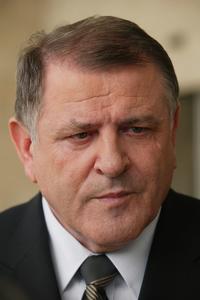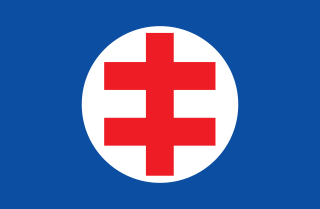Politics of Slovakia takes place in a framework of a parliamentary representative democratic republic, with a multi-party system. Legislative power is vested in the parliament and it can be exercised in some cases also by the government or directly by citizens.

Vladimír Mečiar is a Slovak politician who served as the prime minister of Slovakia three times, from 1990 to 1991, from 1992 to 1994 and from 1994 to 1998. He was the leader of the People's Party - Movement for a Democratic Slovakia (ĽS-HZDS). Mečiar led Slovakia during the dissolution of Czechoslovakia in 1992–93 and was one of the leading presidential candidates in Slovakia in 1999 and 2004. He has been criticized by his opponents as well as by Western political organisations for having an autocratic style of administration and for his connections to organized crime and his years in government became infamously known as Mečiarizmus.

Mikuláš Dzurinda is a Slovak politician who was the prime minister of Slovakia from 30 October 1998 to 4 July 2006. He is the founder and leader of the Slovak Democratic Coalition (SDK) and then the Slovak Democratic and Christian Union. From 2002 to 2006, his party formed a coalition government with the Christian Democratic Movement, the Alliance of the New Citizen and the Party of the Hungarian Coalition. Mikuláš Dzurinda's 2nd government was labelled as a reformist one, pro-market and most effective one in economic matters in Slovakia since 1993. Carried out reforms included flat tax 19%, pension reform, education financing reform. During his term Slovakia joined both the European Union and NATO.

The Slovak Democratic and Christian Union – Democratic Party was a liberal-conservative, Christian-democratic political party in Slovakia. The SDKÚ-DS was a member of the Centrist Democrat International and was a member of the European People's Party until 2018, when it was expelled.

The Movement for a Democratic Slovakia was a national-populist political party in Slovakia. The party is commonly considered as authoritarian and illiberal.

The Party of the Hungarian Community , formerly known as Party of the Hungarian Coalition, was a political party in Slovakia for the ethnic Hungarian minority. It was led by Pál Csáky until the parliamentary election of 12 June 2010 where it failed to acquire 5% of the popular vote, the threshold necessary for entering the National Council of the Slovak Republic. Its votes went largely to Most–Híd, a new party led by former SMK leader Béla Bugár. In response, Csáky and the whole party leadership resigned. SMK-MKP later merged with Most–Híd and another Hungarian minority party (Unity) to form the Alliance in late 2021.

Direction – Slovak Social Democracy, formerly and legally called Direction – Social Democracy, is a national-populist political party in Slovakia led by the former prime minister Robert Fico. The party claims to be social-democratic with Slovak national specifics. Political scientists observe an extremist and anti-establishment rhetoric.

The Party of the Democratic Left was a social-democratic political party in Slovakia from 1990 to 2004. It was founded in 1990 out of the Communist Party of Slovakia.

Hlinka's Slovak People's Party, also known as the Slovak People's Party or the Hlinka Party, was a far-right clerico-fascist political party with a strong Catholic fundamentalist and authoritarian ideology. Its members were often called ľudáci.
The Social Democratic Party of Slovakia was a centre-left political party in Slovakia. Its last chairman, since 1993, was Jaroslav Volf, and its chairman in 1992 was Alexander Dubček.
The Democratic Party was a political party in Slovakia, active between 1989 and 2006.
Liberal Party is a political party in Slovakia founded on 28 March 2003 by dissident parliamentarians who split from Vladimír Mečiar's Movement for a Democratic Slovakia (HZDS). The party was founded under the name People's Union and renamed itself to 'Liberal Party' on 26 March 2007. From 2003 to 2006 the party had MPs in the Slovak Parliament, since 2006 the party is extra-parliamentary. LS runs on a conservative and populist platform.
The True Slovak National Party, also translated as Real Slovak National Party or Right Slovak National Party, was a minor extreme far-right political party in Slovakia. At the 20 and 21 September 2002 legislative elections, the party won 3.7% of the popular vote and no seats. Since that time, the party re-merged with the SNS, which elected Ján Slota chairman.

The Christian Democratic Party was a Christian-democratic political party in the Czech Republic, functional between 1990 and 1996. Its first chairman was Václav Benda, the last chairman from 1993-1996 the former Minister of Education Ivan Pilip.
The Party of Civic Understanding was a centre-left political party in Slovakia between 1998 and 2003. Between 1998 and 2002 the party was part of the coalition government led by Mikuláš Dzurinda, with the founder of the party, Rudolf Schuster, being elected President of Slovakia in 1999.
The following lists events that happened during 2015 in Slovakia.
Olga Keltošová is a former Slovak politician. Before the break-up of Czechoslovakia, she served as Vice President of the Slovak National Council. She was a parliamentary deputy and one of the chief spokespersons for HZDS. From 1992 to 1997, Keltošová was the country's Minister of Labour, Social Affairs and Family. In 1998, she served briefly as Slovakia's ambassador to the United Nations. Subsequently, she became mayor of the borough of Lamač.
The Christian Union is a Slovak right-wing conservative political party based on the values of the Judeo-Christian tradition. The chairwoman of the party since 2019 is Anna Záborská. At present, he has five deputies of the National Council of the Slovak Republic, elected on the candidate of the party OĽANO-NOVA-KÚ-ZZ.
The Alliance is a political party in Slovakia that was founded by merging three political parties representing the Hungarian minority: the Party of the Hungarian Community, Most–Híd, and MKÖ-MKS. The party was originally founded on 22 November 2019 as an electoral alliance to run in the 2020 parliamentary election and was called the Hungarian Community Co-operation. MKÖ-MKS consisted of the "Összefogás–Spolupatričnosť" movement, SMK-MKP, and the Hungarian Forum.








